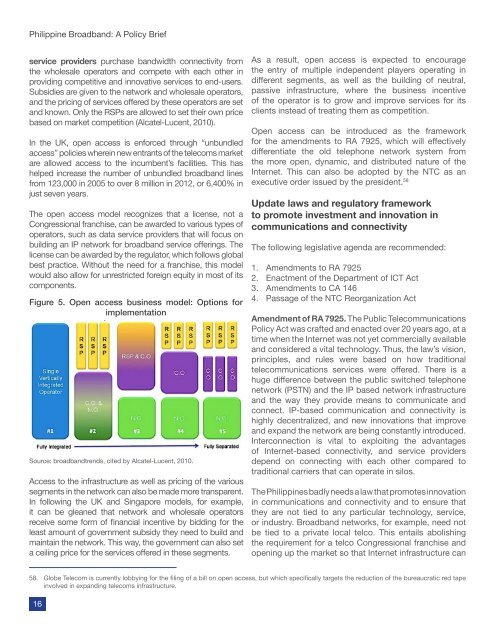Philippine Broadband A Policy Brief
ONLINE-BROADBAND-POLICY-BRIEF1
ONLINE-BROADBAND-POLICY-BRIEF1
Create successful ePaper yourself
Turn your PDF publications into a flip-book with our unique Google optimized e-Paper software.
<strong>Philippine</strong> <strong>Broadband</strong>: A <strong>Policy</strong> <strong>Brief</strong><br />
service providers purchase bandwidth connectivity from<br />
the wholesale operators and compete with each other in<br />
providing competitive and innovative services to end-users.<br />
Subsidies are given to the network and wholesale operators,<br />
and the pricing of services offered by these operators are set<br />
and known. Only the RSPs are allowed to set their own price<br />
based on market competition (Alcatel-Lucent, 2010).<br />
In the UK, open access is enforced through “unbundled<br />
access” policies wherein new entrants of the telecoms market<br />
are allowed access to the incumbent’s facilities. This has<br />
helped increase the number of unbundled broadband lines<br />
from 123,000 in 2005 to over 8 million in 2012, or 6,400% in<br />
just seven years.<br />
The open access model recognizes that a license, not a<br />
Congressional franchise, can be awarded to various types of<br />
operators, such as data service providers that will focus on<br />
building an IP network for broadband service offerings. The<br />
license can be awarded by the regulator, which follows global<br />
best practice. Without the need for a franchise, this model<br />
would also allow for unrestricted foreign equity in most of its<br />
components.<br />
Figure 5. Open access business model: Options for<br />
implementation<br />
Source: broadbandtrends, cited by Alcatel-Lucent, 2010.<br />
Access to the infrastructure as well as pricing of the various<br />
segments in the network can also be made more transparent.<br />
In following the UK and Singapore models, for example,<br />
it can be gleaned that network and wholesale operators<br />
receive some form of financial incentive by bidding for the<br />
least amount of government subsidy they need to build and<br />
maintain the network. This way, the government can also set<br />
a ceiling price for the services offered in these segments.<br />
As a result, open access is expected to encourage<br />
the entry of multiple independent players operating in<br />
different segments, as well as the building of neutral,<br />
passive infrastructure, where the business incentive<br />
of the operator is to grow and improve services for its<br />
clients instead of treating them as competition.<br />
Open access can be introduced as the framework<br />
for the amendments to RA 7925, which will effectively<br />
differentiate the old telephone network system from<br />
the more open, dynamic, and distributed nature of the<br />
Internet. This can also be adopted by the NTC as an<br />
executive order issued by the president. 58<br />
Update laws and regulatory framework<br />
to promote investment and innovation in<br />
communications and connectivity<br />
The following legislative agenda are recommended:<br />
1. Amendments to RA 7925<br />
2. Enactment of the Department of ICT Act<br />
3. Amendments to CA 146<br />
4. Passage of the NTC Reorganization Act<br />
Amendment of RA 7925. The Public Telecommunications<br />
<strong>Policy</strong> Act was crafted and enacted over 20 years ago, at a<br />
time when the Internet was not yet commercially available<br />
and considered a vital technology. Thus, the law’s vision,<br />
principles, and rules were based on how traditional<br />
telecommunications services were offered. There is a<br />
huge difference between the public switched telephone<br />
network (PSTN) and the IP based network infrastructure<br />
and the way they provide means to communicate and<br />
connect. IP-based communication and connectivity is<br />
highly decentralized, and new innovations that improve<br />
and expand the network are being constantly introduced.<br />
Interconnection is vital to exploiting the advantages<br />
of Internet-based connectivity, and service providers<br />
depend on connecting with each other compared to<br />
traditional carriers that can operate in silos.<br />
The <strong>Philippine</strong>s badly needs a law that promotes innovation<br />
in communications and connectivity and to ensure that<br />
they are not tied to any particular technology, service,<br />
or industry. <strong>Broadband</strong> networks, for example, need not<br />
be tied to a private local telco. This entails abolishing<br />
the requirement for a telco Congressional franchise and<br />
opening up the market so that Internet infrastructure can<br />
58. Globe Telecom is currently lobbying for the filing of a bill on open access, but which specifically targets the reduction of the bureaucratic red tape<br />
involved in expanding telecoms infrastructure.<br />
16


